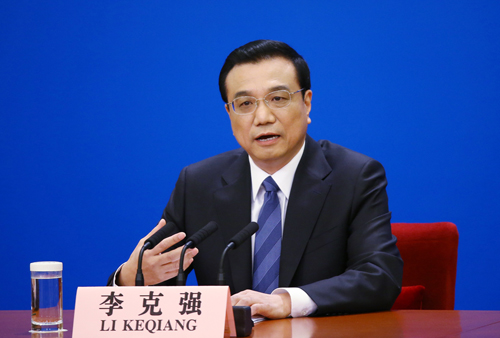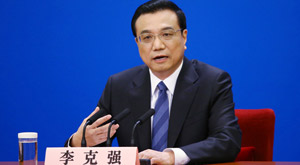Premier Li Keqiang meets the press
china.org.cn / chinagate.cn, March 13, 2014 Adjust font size:
|
|
|
Chinese Premier Li Keqiang is hosting a press conference at the Great Hall of the People in Beijing. |
[12:23] That’s it for the live blog. Thanks for following along with us.
[12:20] Premier Li Keqiang: This is the end of the conference, and it is now time for lunch. Thank you for taking part in today’s press conference.
[12:10] CRI: How have the government’s plan to establish a social security safety net been going?
Premier Li Keqiang: We have three major tasks: 1) meet basic needs, 2) provide a safety met, and 3) increase social equality. We want to improve the safety net covering areas including education, housing and medical care. We will expand the coverage of programs. This year we will increase the standard for old-age security, bring it in line with the market, and unify the medical and old age insurance systems in urban and rural areas. China is still a developing country. The social security standards are still low. Many people need aid in times of disaster. In these cases, basic welfare is not enough. The government should always prioritize the needs of the people.
We will get rid of the people’s worries regarding employment and starting businesses, and create a level playing field. We are increasing educational equality and giving more people in poor areas access to high-quality education. We will improve education in rural areas, and make sure that everybody has an equal chance to develop themselves.
[12:07] @ Sina weibo Qingtong Tidao:
The Ministry of Agriculture should think about why the people choose to believe journalist Cui Yongyuan’s theory on genetically modified foods rather than those of the agricultural experts. The ministry’s response to Cui’s questioning on GM foods and the media’s coverage on the issue in the two sessions is what I care about most.
[12:03] RTL Netherlands: You went to Europe last year to solve the photovoltaic industry dispute and promoted Chinese nuclear energy and high speed rail in Europe. What obstacles are there for Chinese companies entering the European market and how will you improve market access to China?
Premier Li Keqiang: Promoting the rights and interests of Chinese companies overseas is part of my job. I said to the European leaders that Chinese companies can deliver high speed rail equipment very quickly. We are upgrading our industries and making them more competitive. We can’t just export toys. We buy a lot of parts from abroad. There are benefits for both sides. My message for Chinese companies is: We have given our word about the quality of Chinese equipment. I hope that you will not prove us wrong. If Europe and China respect each other, then we can solve trade disputes. We don’t want to lose out on Europe because of individual cases, as it is our largest trading partner. We are currently carrying out Europe-China investment negotiations to create the conditions to increase mutual investment.
[12:00] @ Sina weibo Xibian Yu Mengmeng:
The lack of information about the development of small-and-medium-sized enterprises makes me uneasy. We care about whether there are any representatives in the two sessions are from micro and small enterprises and whether their proposals have drawn any attention. We don’t know if the problems impeding the development of MSEs can be improved or solved.
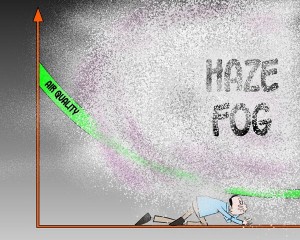
[11:57] China National Radio: In your report you said China is ‘declaring war on smog.’ What do you mean by “declaring war?”
Premier Li Keqiang: PM2.5 control has become a major issue for the people. We are not declaring war against nature. We will upgrade our growth model. We monitor PM2.5 in 161 cities. The government is taking more responsibility and has set a target to reduce energy intensity by 3.9 percent this year. We will hold businesses that do not take responsibility accountable. We need to continue to fight smog actively. It is a long-term endeavor.
[11:48] Xinhua: What new real estate measures will the government plan to take?
Premier Li Keqiang: The government’s goal is to make sure everybody has housing. We will take diverse measures according to the situations in different cities. We will renovate at least 4.7 million housing units to help meet the people’s basic housing needs. Even one small action is more important than a thousand words. We will take a differential approach in regulating the housing market. There will be a long term mechanism for the real estate market.
[11:44] Taiwan Dongsen TV: What are your expectations for the development of cross-Straits relations this year?
Premier Li Keqiang: The people on both sides of the Taiwan Strait are one family. Last year, the media on both sides chose the Chinese character for ‘progress’ for 2013. This is the development trend. People to people exchanges and trade between the two sides are important components. Eight million visits were made between the two sides last year – a new high. We are making progress within the economic framework.
[11:42] @ Sina weibo 58 Lao Qiang:
Will house prices continue to rise? How can we solve the troublesome doctor-patient relations? How can we guarantee food safety? These conundrums have been put before the NPC deputies and CPPCC members. The two sessions will bring new expectations, and the debates reflect reality.China can only fulfill its people’s expectations and reduce their worries by continuing its reforms.
[11:40] China Daily: In what area can a breakthrough be made in reform?
Premier Li Keqiang: China is deepening reform in all areas. Out of 40 executive meetings of the State Council held in 2013, 30 have been related to reform. Our focus is to increase the vitality of the market and the creativity of society and to allow the people to benefit. Thirty years ago I was a village head. The people just wanted to get enough to eat. The land was later contracted to the villagers and they could decide how to use it. We solved the problem of subsistence. Our reform will come about as the result of a process. This year we will continue to delegate power and allow the market to play a full role. We will continue financial and fiscal reforms. For example, there will be new tax reduction measures this year for small and micro enterprises, and a focus on old-age insurance. The focus is on implementing the reforms. We wanted the people to benefit. Some government departments will lose power and companies will face pressure, but we will carry out our reform without hesitation.
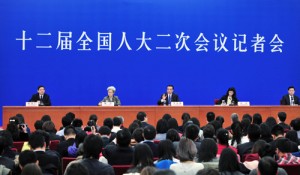
[11:37] @ Sina weibo Yansha Xishui Sunny:
Competition in the world today is increasingly intense. It is fundamentally competition of education and talents. In a word, I hope the deputies in the two sessions will reflect the real conditions of the current education system and support the expansion of the ongoing reform of exam-centered schooling.
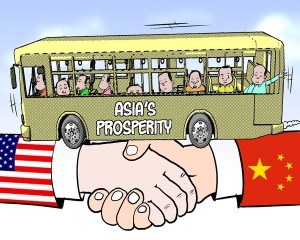
[11:35] AP: What are the obstacles in improving China-U.S. relations and what change does China want to see from the United States?
Premier Li Keqiang: Last year President Xi met President Obama in the United States and reached a consensus on building non-conflictual and mutually beneficial cooperation. There are differences but these are necessary pains in growing cooperation. As long as differences are managed, then relations can be improved. There are more common interests between China and the United States than differences. Wise people seek common ground and the foolish focus on differences.
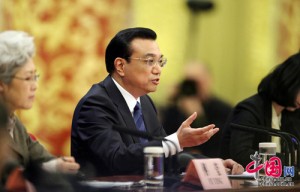 |
|
Chinese Premier Li Keqiang is hosting a press conference at the Great Hall of the People in Beijing. |
[11:30] Hong Kong Commercial Daily: What’s your view on the development prospects for Hong Kong?
Premier Li Keqiang: Hong Kong has continued to prosper in difficult economic conditions. It has maintained its competitive edge. It has made an important contribution to China’s reform and opening up. The Chinese government’s policy towards Hong Kong and Macao is consistent and clear-cut. The government will continue to support Hong Kong as a financial, shipping and trading center.
[11:25] CNBC: What will be the slowest growth rate that the government would find acceptable in 2014 without stimulating the economy?
Premier Li Keqiang: I have read negative reports about the Chinese economy. Last year we met our growth targets without stimulating the economy, so why can’t we do it again this year? We are most concerned about employment, increasing incomes, and the people’s livelihood. I have visited families where none of the family members have a job. We need appropriate GDP growth to safeguard employment. We are flexible. We are not just looking for GDP growth that can benefit the people and contribute to environmental protection.
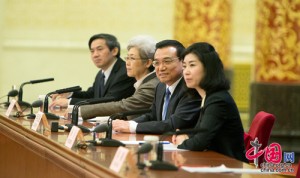
[11:17] CCTV on streamlining administration: How can the government ensure that regulations are fully implemented?
Premier Li Keqiang: Last year, 416 administrative items were cancelled or delegated to local governments. The reform has made the market more dynamic. Newly registered companies grew 27.6 percent last year and private companies grew 30 percent — the highest figure in 10 years. Streamlining administration is the key to energizing the market. Letting go doesn’t mean the government will not be in control, it means making improvements, punishing IP infringements and polluting industries harshly and increasing market oversight. The government is determined to see the reform through and manage the government-market relationship.
[11:09] @ Sina weibo Pingjing 1071:
I hope the government will enhance its efforts in the anti-corruption drive after the two sessions, retrieve the embezzled money and spend it on a free healthcare system and improving the people’s fundamental livelihood.
[11:08] Reuters: What was the biggest challenge in China’s economic growth over the last year and what issues need to be resolved?
Premier Li Keqiang: The biggest challenge has been downward pressure. There was a money squeeze last year in the inter-bank lending rate and slumps in some key indicators. Some said that there would be a hard landing in the Chinese economy. Institutional solutions were necessary, including macro control, restructuring and allowing the market to play a greater role. We met our targets. This year there are greater challenges — maintaining growth and employment, controlling inflation and environmental protection. We need to be prepared. The Chinese economy has great potential and we have the ability to maintain full control this year.
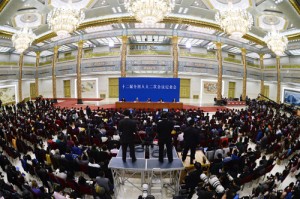
[11:03] Singapore’s Zaobao.com on China’s diplomacy with neighboring countries.
Premier Li Leqiang: China is determined to follow a path of peaceful development, and uphold its sovereignty and territorial integrity. As long as neighbors can manage difference and respect each other’s interest then there will not be clashes. In Vietnam last year, I reached a consensus with the Vietnamese leaders. I also talked about China’s international relations with a local shop owner.
[11:00] People’s Daily: Whether there are institutional flaws and what will be the next steps in China’s anti-corruption drive?
Premier Li Keqiang: The Party and government are firm in fighting corruption with zero tolerance. China has the rule of the law. All corrupt officials will be dealt with equally, regardless of their position. A list of powers will be released to the public. There will be a full audit in key areas like land transfer and mining rights so corrupt officials have nowhere to hide.
[10:57] @ Sina weibo Wang Hong’en:
I hope everybody can afford to buy a house, see the doctor and get an education, inhale poison-free air and have safe food, tickets home when they need them and a free plot in a cemetery after they die!
[10:53] Question from Financial Times: How the Chinese government will handle financial and debt risks?
Premier Li Keqiang: There is concern about downward pressure in the Chinese economy. Last year, China achieved its GDP growth target. The comprehensive public audit last year showed that the government debt is controllable, and below the internationally recognized warning line. The government has tightened regulation and implemented Basel III. Defaults may not be avoidable in some cases but the government will work to reduce systemic risks.
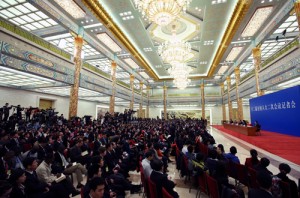 |
| The Great Hall of the People is filled to capacity with journalists. |
[10:35] Question from CNN on the reaction to the missing Malaysia Airlines flight MH370 and the safety of the Chinese people at home and abroad:
Chinese government is deeply concerned about safety of passengers. There are 8 Chinese vessels in the sea area, and 10 Chinese satellites have joined the search. Yesterday Premier Li spoke to one of the captains. China has asked parties to enhance coordination. China will enhance international cooperation to ensure the safety of Chinese citizens abroad.
[10:33] The Premier is making a few remarks before answering quetions from journalists
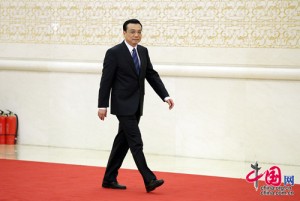 |
|
Chinese Premier Li Keqiang is hosting a press conference at the Great Hall of the People in Beijing. |
[10:30] Premier Li Keqiang has entered the press conference
[10:24] The premier refuses no questions.
[10:23] Over the 16 years, there have been 90 questions on China’s macro economy and diplomacy, 43.3 percent of all the questions asked. There have also been 59 questions – 28.4 percent of total – on China’s international relations, especially on China-Japan relations and China-U.S. relations.
A number of reporters have shown the interest in the premier himself and have asked him personal questions.
[10:07] Officials in charge of the press at the NPC have explained that having the premier meet the press was originally intended to allow the international media better understand China’s domestic and foreign policies, so there are more opportunities for the international press to ask questions.
Premieres have also voluntarily sought questions from international agencies.
At the premier’s press conference in 2008, Wen Jiabao said, “Are there any members of the French press here? Let’s give an opportunity to a French journalist.”
[10:02] Caixin.com:
The foreign media are paying close attention to China’s ongoing two sessions, but it seems that they haven’t many exciting things to report except for some of the major points from the Premier’s government work report. Some foreign journalists are sniffing around for something special. For example, some are eager to figure out what kind of cars the deputies drive.
[09:58] A pass for the premier’s press conference is difficult to obtain. Only 600 reporters, among the 3,000 who have the NPC press cards, receive an invitation. The chance of raising a question is even slimmer, as only 13 will be picked by the mediator.
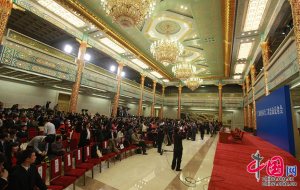 |
| The Great Hall of the People is filled to capacity with journalists. |
[09:55] The Great Hall of the People is filled to capacity with journalists.
[09:48] Zgxczs.cnr.cn:
Issues concerning agriculture, rural areas and farmers (“the three rural issues”) have become top priorities not only in Premier Li’s government work report, but also in the work reports of the Supreme People’s Court and the Supreme People’s Procuratorate. Both the NPC deputies and the CPPCC members have paid particular attention to these issues. The “three rural issues,” now the keywords of this year’s two sessions, will also be at the forefront of China’s future reform and development.
[09:35] Zhang Dejiang announced the conclusion of the second session of the 12th National People’s Congress (NPC).
[09:29] Zhang Dejiang, chairman of the NPC Standing Committee, said in his address at the closing meeting of the session,
"The session was an event where the lawmakers reached consensus, defined major missions and strengthened confidence on the country’s development.
At the session, the NPC deputies examined and approved a number of important documents, including the government work report, the national economic and social development plan and the central budget.
They also endorsed the work reports of the NPC Standing Committee, the Supreme People’s Court and the Supreme People’s Procuratorate."
[09:27] Zhang Dejiang, chairman of the Standing Committee of the National People’s Congress (NPC), is delivering a speech at the NPC closing meeting.
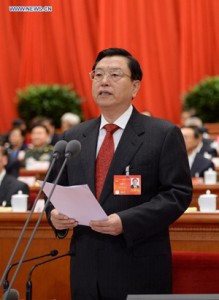 |
|
Zhang Dejiang, chairman of the Standing Committee of China’s National People’s Congress (NPC), presides over the closing meeting of the second annual session of China’s 12th NPC at the Great Hall of the People in Beijing, capital of China, March 13, 2014. |
[09:03] The National People’s Congress, China’s top legislature, is holding the closing meeting of its annual session.
[08:46] According to the agenda, following documents will be put for voting at the closing meeting of the session.
draft resolution on the government work report;
draft resolution on the implementation of the 2013 plan for national economic and social development, and on the draft 2014 plan for national economic and social development;
draft resolution on the implementation of the central and local budgets for 2013, and on the central and local budgets for 2014;
draft resolution on the work report of the NPC Standing Committee;
draft resolution on the work report of the Supreme People’s Court;
draft resolution on the work report of the Supreme People’s Procuratorate.
draft resolution on the resignation of two NPC Standing Committee members.
[08:41] @ Sina weibo Chengpin Zhizhe:
I personally think most of the proposals (submitted in the two sessions) were superficially written and full of moaning. Some of the representatives only submitted proposals about their professions, disregarding the people’s fundamental interests. I simply think it would be good enough to solve the problems of house prices, employment, healthcare, the income gap, basic social security, environmental protection and the corruption of officials.
[08:40] A total of 468 motions have been submitted to the country’s top legislature this year, according to the third meeting of the presidium of the second session of the 12th NPC.
[08:35] Amid the 16 revisions, “to promote the use of new energy vehicle” has been added to propel the industry’s development in an effort to preserve energy and cut emissions, as well as prevent and control air pollution.
Others include “to attach importance to scientific popularization and construction of scientific spirit,” “to build a harmonious doctor-patient relationship” and “to cultivate a new type of professional farmers.”
[08:33] The State Council has made revisions to the government work report that will be put for voting at the annual parliamentary session, which is to close today.
[March 13, 08:28] The Closing meeting of the Second Session of the 12th National People’s Congress (NPC) will be convened at the Great Hall of the People in Beijing at 9am.

